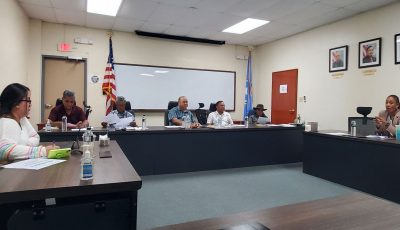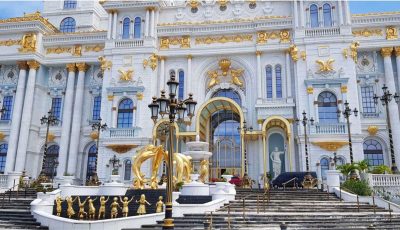IPI to open Friday, not for business
Imperial Pacific Resort Hotel Saipan will push through with its Friday opening but it is not clear if the casino floor—which was supposed to begin operating first—would welcome its first players or not. A source close to Imperial Pacific International (CNMI) LLC said that workers would clean some areas of the construction site, like clearing debris and other materials.
Imperial Pacific Resort is the first phase of IPI Holdings’ multi-billion dollar development project on Saipan. It plans to ultimately have 140,000 square meters of entertainment and gaming facilities. The hotel will have 340 suites and 15 deluxe villas.
In a regulatory filing at the Hong Kong Stocks Exchange, the Saipan casino operator’s parent company, Imperial Pacific International Holdings Ltd., announced that Saipan’s lone casino would open on March 31.
IPI Holdings said they expect the permanent casino site to be completed in time for Friday and will also be open to the public. “The hotel of the Imperial Pacific Resort will be opened in the second half of 2017.”
In the same filing, the Hong Kong-based holding company said the initial gaming facility of their hotel casino will have 193 gaming tables and 365 slot machines, which is a significant increase compared to the 48 tables and 141 slot machines at their temporary facility inside the T Galleria Saipan.
CalvinAyre.com mentioned that the casino investor reportedly had gross revenues of $964.2 million in 2016, a significant increase from $871.56 million in year-on-year terms. IPI has also declared that they have already invested $343 million on their multi-million-dollar casino project as of December 2016.
Commonwealth Casino Commission vice chair Joseph C. Reyes said it would be up to the Department of Public Works if they would allow Imperial Pacific Resort to open tomorrow.
“That is still the question that’s up in the air. We don’t know if they would open or not.”
“But I can tell you this, I don’t think that they would be allowed to open without the proper permits. DPW is the one that would issue the certificate of occupancy, whether full or partial. A full occupancy permit is now impossible; whether DPW would grant them a conditional permit, that we don’t know. It is better to ask DPW Secretary [James Ada].”
Capacity to pay
Reyes said they are also making sure IPI would comply with the minimum bankroll program that would assure players and other patrons they have the capacity to pay the winnings.
At least $15 million cash on hand is required in the minimum bankroll program, 1 percent of the casino’s turnovers.
“Would you go and gamble—spend your money and win—only to learn the gambling facility could not pay you? If one patron could not be paid, the integrity of the commission would be in question because we failed to do our job,” said Reyes.
“Our [casino commission] job is to make sure that the licensee does have enough cash and the capacity to pay the winners.”
Another Bloomberg report
Financial media company Bloomberg came out with a report on Tuesday linking Esteem Capital Success Ltd. to Saipan’s lone casino operator IPI.
Esteem Capital has been identified as the company that paid the fact-finding trip to Hong Kong and Macau by then-senator Ralph DLG Torres and other CNMI lawmakers.
CCC vice chair Reyes, in a telephone interview, said that Bloomberg’s story is old news. “We don’t know who their source is and whether we should look into it. This is already old news.”
The administration, in a statement sent to Saipan Tribune, said that Torres was unaware of the Hong Kong court’s judgment and he would not comment on the ruling.
“At the time the governor (when he was still a senator) took part in the fact-finding trips to Hong Kong and Macau, he was offered no reason to establish a connection between Esteem Capital and Imperial Pacific,” the statement said.
“Only that Esteem Capital had and was in the business of promoting integrated resorts in Asia and other possible locations. The purpose of the trips was to experience first-hand the operations of integrated gaming resorts and to see if bringing such a business to the CNMI was something that could be done.”



























